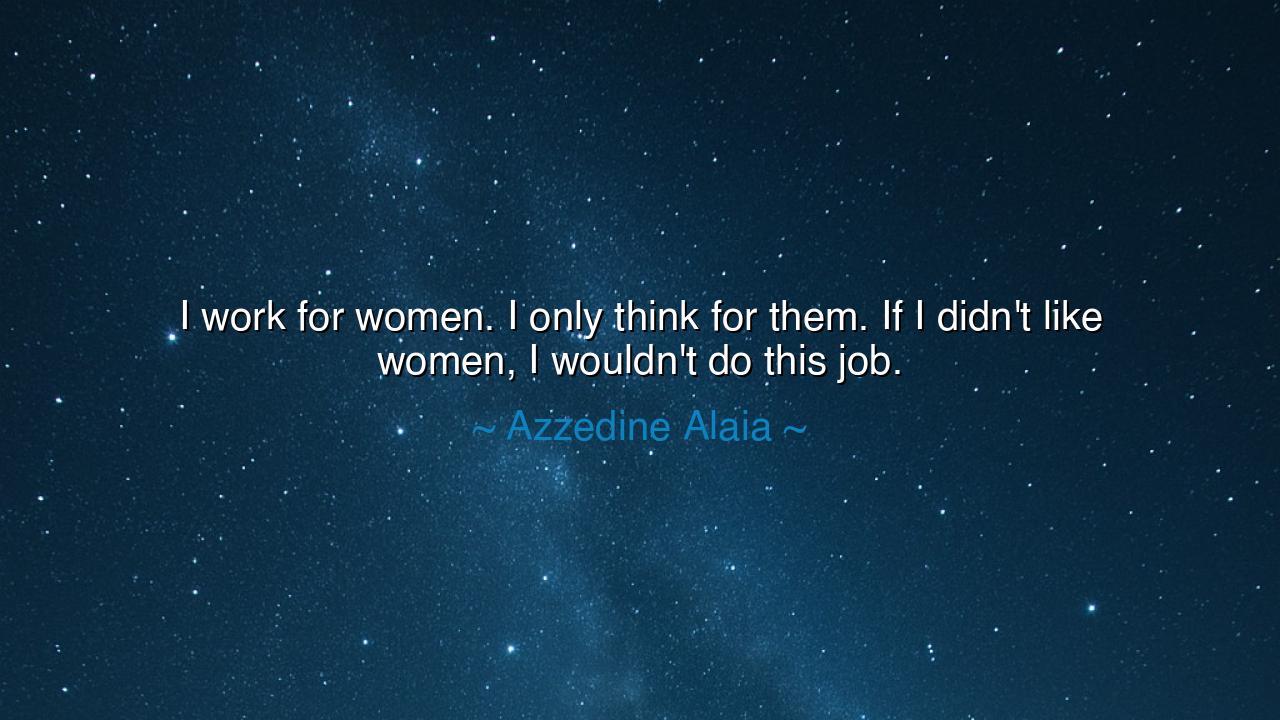
I work for women. I only think for them. If I didn't like women
I work for women. I only think for them. If I didn't like women, I wouldn't do this job.






The words of Azzedine Alaïa — “I work for women. I only think for them. If I didn’t like women, I wouldn’t do this job.” — resound like the vow of an artist bound to his sacred calling. In these words, he reveals that women were not his subjects to be adorned, but the very essence of his inspiration, the reason his craft drew breath. Fashion for him was not vanity, but devotion: to reveal strength, grace, and beauty already present, to serve rather than to dominate.
Alaïa’s statement tears away the shallow veil of mere commerce in fashion. Many create garments for profit or prestige, but he declares that his art was born of love — a profound admiration for women, their forms, their mysteries, their dignity. To “work for them” was to place himself in the role of servant, priest, and craftsman, shaping fabric into armor and adornment that exalted the spirit as much as the body. His work was not about himself, but about the women who wore his creations, and in this humility lay his greatness.
History offers us other witnesses to this spirit of devotion. The sculptor Phidias, who carved the form of Athena for the Parthenon, was not merely shaping stone, but giving form to an ideal of wisdom and power embodied in the goddess. So too did Alaïa, in a modern age, sculpt with cloth rather than marble, exalting real women rather than myths. His artistry made them feel divine, for he understood that the highest calling of creation is to honor and uplift others.
The origin of such devotion lies in perception — to see women not as ornaments but as the source of life, strength, and continuity. Alaïa’s life, rising from humble beginnings in Tunisia to the heights of Parisian couture, was itself a testament to the power of serving a higher purpose rather than personal glory. In every stitch he placed, he declared: “I see you, I honor you, I work for you.”
Therefore, O children of the future, learn from his words: let your labor serve something beyond yourself. Let it spring from admiration, from love, from the desire to give dignity to others. For the work that exalts the self alone perishes quickly, but the work that honors others endures. Azzedine Alaïa reminds us that to truly work for women is not to clothe them, but to celebrate them — and in this lies the noblest form of artistry.






TMHoang Thao Minh
I really admire that Azzedine Alaia is so passionate about designing for women, but I also wonder if this focus sometimes oversimplifies the complexity of women’s needs and desires. Women are diverse in age, body types, backgrounds, and cultures—how does Alaia account for this diversity in his work? Can one person’s vision of what women want ever fully represent such a wide range of experiences?
TTTruong Thi Thanh Truc
Alaia’s dedication to women seems sincere, but I can’t help but question whether focusing so intensely on one group is the most effective way to create universally appreciated art or fashion. If his work was so specifically aimed at women, how does that fit into the broader conversation about gender equality? Should designers and creators aim to serve everyone, or is it okay to have such a targeted approach?
NTDoan Pham Ngoc Thanh
I find this quote really intriguing. Azzedine Alaia seems to be making a very personal statement about his commitment to women, especially in an industry often criticized for objectifying them. But it also makes me wonder: is it possible to truly ‘work for’ one group of people, especially in fashion, without considering the broader diversity of experiences within that group? What does it mean to work for women in a way that’s inclusive and not reductive?
LAlan anh
It’s interesting that Azzedine Alaia says he works only for women and thinks only for them. Does this suggest that his designs were truly created with women’s needs and desires in mind, or is he just making a bold statement about his intentions? I do appreciate that he acknowledges a deep connection to the women he designs for, but can we take his words literally, or is this more of a symbolic sentiment?